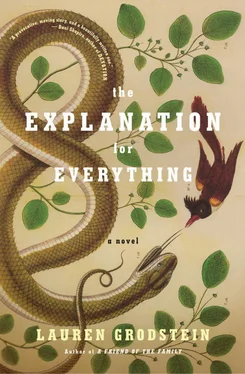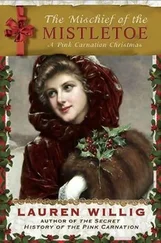“Is he a friend of yours?”
“Yes,” Andy said.
“Why do you call him Mr. McGee if he’s your friend?”
“I don’t know his first name,” Andy lied.
“You don’t know it?”
Andy had never told his daughters the real reason he went, alone, to Okeechobee every few years. He told them it was a conference. He didn’t want them to think of their mother’s death, or her killer, or that, perhaps most frightening, that their father felt vengeful often to the point of derangement. “Why don’t you know your friend’s name?”
He stood, opened the refrigerator, poured her some more milk.
“Is it Oliver?” Belle asked.
“Yes,” Andy sighed.
“He’s the one who killed my mom?”
“Yes,” Andy said. The chill of the refrigerator air on his arms.
“What are you saying about him?”
“I’m writing to the jail,” he said. He closed the refrigerator door. “They want to let him out.”
“Will they?”
“I hope not,” he said.
“Why not?
“I don’t know, Belle.” What should he say? “I hope they don’t, but I actually don’t know. But even if they do, you know—even if they do, he can never hurt us again.”
“Thank you,” said Belle, taking the milk from his hands. Andy waited for the warmth to return to his hands. Oliver McGee was sitting in a jail cell just outside Okeechobee. His wife was cremated and sprinkled into the Atlantic. But he and Belle and Rachel were here, in this kitchen, in this house; they were together, they were alive.
“I’m sorry,” he said. “I shouldn’t have lied to you.”
“What did you lie about?” Belle said.
“Not knowing Oliver’s name,” he said. “I know it.”
Belle didn’t seem to care one way or another. She poured the rest of the milk in the sink, deposited the cup. “I didn’t think he would hurt us. Grandma told us he was just a kid who made a stupid mistake.”
“Grandma said that?”
“She said he would suffer for it the rest of his life, just as much as we would.”
“Wow,” Andy said. “I never knew you talked to Grandma about it.”
“I used to, when I was little,” Belle said. She stood in the half-darkened doorway, her lovely face invisible in a shadow. “They should probably let him out of prison by now, don’t you think? He’s been there a really long time. Especially if he was just a kid when the accident happened.”
“I don’t think so,” Andy said. “I don’t think they should ever let him out.”
“Yeah,” Belle said. “I guess.” She blew him a kiss, their good-bye sign, then disappeared down the hall.
He had to remind himself that to Belle, Lou was just an idea, not a memory.
Andy reread his statement. It filled him with shame. He pressed delete, stretched his fingers, started again.
ON THE SUNNY October day Andy’s mice once again refused to drink as much as he predicted they would, Lionel Shell stood outside his office for three hours with a sign around his neck that read, GENESIS 1:1. Andy was downstairs, staining slides, listening to the radio, could have stayed there for hours, but eventually Rosemary panicked and called him in his lab. “This kid’s not going anywhere. He’s just staring like a lunatic. What if he starts shooting the place up?”
Andy sighed, turned off the radio, This American Life. His thumbs were stained from methylene blue. He’d always imagined he’d have a grad student or several to help him with this kind of work. He scrubbed his fingers with Borax in his tiny industrial sink, headed upstairs slowly, thinking about the proteins in the drunk mice’s brains.
When he got to the fourth-floor biology suite, he found Rosemary standing by the door, twisting her watchband. Down thirty paces stood poor Lionel, ramrod-stiff. “It doesn’t look like he’s packing, Rosemary.”
“You never know these days.”
This was true. At each new school shooting, high school or postsecondary, the entire Exton Reed faculty began assessing their classrooms for the militant or suicidal, plotting escape plans out of hard-to-open windows or heavy doors. “I’ll talk to him,” Andy said. It was a Friday afternoon, typically empty, and he wondered if Lionel had organized his lonely protest deliberately for a day when he wouldn’t have to confront anybody.
“Hey, Lionel,” he said. “Everything okay?”
Lionel blinked. He didn’t turn around. Andy noticed the white earbuds.
“Hey!” he yelled. “Lionel! Turn off that iPod and talk to me.”
Was it possible the kid had tears in his eyes? Lionel shrugged, turned off the music, and buckled to the floor, assuming a cross-legged slump in front of Andy’s door. His sign rested against his folded legs.
“Sorry, Professor.”
“It’s okay.” He wasn’t sure if he should bend down or make Lionel stand up. “What are you doing here?”
“I’m protesting.”
“Clearly,” Andy said. He sighed, bent heavily to the floor himself so he could be closer to Lionel’s face. “Listen, Lionel, it’s fine if you want to protest, but I’m not sure what sitting outside my office on a Friday is going to do for you.”
Lionel waved him away. “It’s important to me that people know about what you’re teaching. Or I guess it’s just important to broadcast that somebody cares. It’s easy to think nobody cares about anything at this place, but I do. I hate what you teach. I’m sorry,” the tears filled his eyes but did not spill over, “I just hate it.”
“You don’t have to apologize,” Andy said, although, petulantly, he did feel a little stung. Disagreement was one thing, but hate? “So why are you taking the class again if you hate it so much?”
“Because somebody has to keep tabs on what you do! Somebody has to keep an eye on you.”
“Ah,” Andy said, letting his butt sink down to the floor to ease the twinge in his back. Poor Lionel. The kid wore dirty sneakers, loose jeans. He probably weighed 130 pounds. Andy knew he was on a full scholarship, and there was that underfed, vulnerable look about him, that full-scholarship look. “But why don’t you write letters to the editor, that sort of thing? It might get more done. I mean, I appreciate what you’re trying to do here but what’s the point of a protest if there’s nobody here to see?”
Lionel shrugged. He fiddled with his iPod. He’d been listening to someone British read the Bible.
“My sister’s an existentialist. Do you know what that is?”
“An existentialist?” Andy said. “In Delaware?”
“She’s actually my twin. She goes to community college. Her name is Sara.”
“That’s my daughter’s middle name,” Andy said, to make a connection. Lionel didn’t bite.
“She thinks that there’s no point to anything. That we could live or die, and it doesn’t really matter, and anyone who thinks it matters is a fool. She reads a lot of French writers.”
“It’s a pretty French idea,” Andy said.
“And she’s very dismissive of the way I think, that there’s a God who’s watching over us. And I think she’s as wrong as anyone can be, but then I look around at the stuff we do to each other, the stuff we teach, and then I think maybe she’s not so wrong, you know?”
“Which scares you.”
Lionel shook his head no, and Andy remembered he should never accuse a young man of feeling scared. “It just makes me sad.”
“I’m not an existentialist, Lionel,” Andy said. “I don’t know if that makes you feel better or not. I believe that life matters.” As he said that, he felt it to be true, although he also knew this wasn’t always what he felt.
“But how can you believe that without God?”
“Because, Lionel, I don’t need the supernatural to give my life meaning.”
Читать дальше












